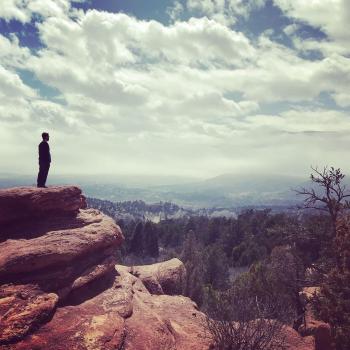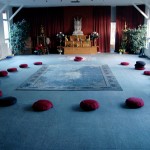In the book ‘A Fearless Heart,’ Thupten Jinpa (PhD and former monk) describes a list of skills that help us to cultivate compassion. I think this is a good list, so I thought I would share it with you. He calls these skills “settling the mind.” You see, we have to calm down and see things clearly in order to learn how to manifest the compassion that is part of our basic nature as human beings. If we don’t see things clearly, we aren’t making the best decisions for ourselves and others. If we’re anxious or agitated we’re also not making the best decisions for ourselves and others.
So, below are the three skills Jinpa lists as necessary for settling the mind and cultivating compassion.
- Quiet the Mind
- Develop Concentration through Focused Attention
- Strengthen Our Awareness
He says “Our quiet, concentration, and awareness skills help us guide our mind the way we would like it to go.”
If we want to incline our minds toward compassion, of course an important step is learning that skill to incline our minds toward things. Lists like this in meditation classes are not uncommon. We could call it Relaxation, Concentration, and Wisdom if we wanted and the meaning would be mostly the same.
- Quiet the Mind
This is where we’re trying to learn how to relax our minds. We have nearly constant mental chatter that gets in our way a lot of the time. We obsess about our successes and failures, we spend a lot of time worrying in ways that are unnecessary. We get so lost and confused in our thoughts that we often have trouble being present. So, we want to learn to quiet our minds. Our meditation practice can help us do this.
Jinpa says, “To quiet the mind is to relax the mind. We learn to unhook our awareness from the restless tiresome activity of habitual thought pattens and from our instinctive and automatic emotional reactions to these. A quiet mind is a place where we can more readily be present, which makes us available to care for ourselves and others.”
It’s hard to give the person in front of you the attention they need and deserve if you’re mentally somewhere else because you’re thoughts are loud and distracting. Quieting the mind is where we just take a moment to settle ourselves down. We need mental space.
- Develop Concentration through Focused Attention
This is what people often think of when they think of meditation practice (if they think of anything). This is where we are consciously and deliberately paying attention to something and making that our focus. The breath is a good one. A burning candle is a good one. Just the passing of thoughts into and out of our consciousness is a good one too. This is concentration training. We are learning to put our focus on something and keep it there. It’s very hard sometimes. I can be sitting there trying to place attention on my breathing and thoughts come into my head about things like what happened yesterday or what I want for dinner. This is very normal. When this happens I have to gently direct my attention back to my breath. In doing this over and over we are strengthening our ability to focus and concentrate, so when we want to pay attention to something we can be good at it. And also when there’s some nonsense that I can’t seem to stop thinking about, I can have that ability to place my attention somewhere else instead.
Jinpa says, “Through contemplative training, we learn to harness our natural capacity to apply our mind, so that we may choose when and what to focus on.”
- Strengthen Our Awareness
This is where we are learning to see things clearly. We are training to step outside our narrow self interest and the filters we put on our experience. We rarely see things as they really are. If you’ve ever had a bad day at work and then been really annoyed by everything that happens at home, you know what I’m talking about. Our perception of what’s happening in any situation is impacted by what has happened in other situations. This includes ourselves. We often either see ourselves as either really great or really worthless. The truth is we’re somewhere in the middle. Jinpa calls this “meta-awareness” which means it’s beyond normal awareness. I like words like wisdom and clarity for this. It’s learning to step outside ourselves and be like a witness to what’s happening instead of always obsessing about ourselves and having thoughts like ‘why is this happening to me?’
Jinpa says, “By strengthening our meta-awareness, we become more self aware and more aware of others. We put ourselves in the courageous position of being with things as they actually are, since we know there’s a calm place within ourselves where we can stand. We acknowledge our thoughts and feelings, including the more adverse and painful ones.”
And he goes on to say, “Meta-awareness lets us be with our own and others’ suffering without feeling threatened by it, because we can step back and make room for all of it, rather then get caught up and thrown off. This, in turn, allows our compassionate instinct to express itself as it naturally does in the face of suffering and need, when it’s not held back by fear.
My mother always told me, “Make good choices,” That was her great wise advice. We do want to make good choices. And training in clarity helps us a lot in knowing what the right choices are. We don’t always know what the good deeds are when we’re not seeing things clearly and our attention is fractured. So, sometimes we may be tempted to separate things. We may be thinking we’re doing some practices to train our minds and some other practices to train our hearts. The truth is it’s all together, there is no separation.
Let’s train our hearts and minds.
===================================
interested in reading this book? You can get it here:
==================================
If you’re here in Kansas City, I have a free public event coming up. Details are here:
2/26/22 2pm @Aquarius KC
Talk: Boundless Heart Meditation
=====================================
AND finally, if you want to help us build a new Buddhist temple in Kansas City, you can click here:
Rime Center Temple Project
The Rime Buddhist Center wants to be a positive force in the community. A sacred place that is full of learning, reflection and joy. We want to be a spiritual home to a vibrant sangha – your spiritual home. We invite you to participate in a truly unique project – building the first Tibetan Buddhist Temple here in Kansas City. Support us as we open the doors of loving-kindness and achieving peace through compassion.













